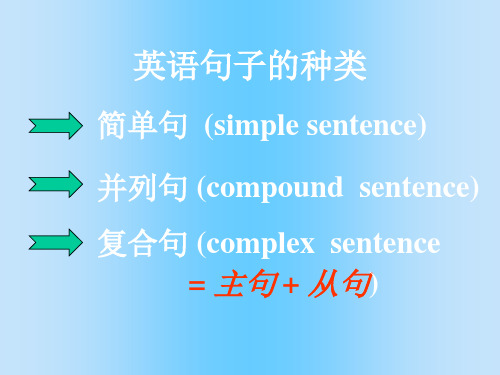高考英语简单句,并列句,复合句
- 格式:pdf
- 大小:1.15 MB
- 文档页数:9

英语句子结构分类英语句子结构分类:简单句,并列句和复合句的概念及区别1.简单句:无论句子长短,只包含一套主谓结构,句子中个个成分都是单词或短语。
有时主语或谓语可以是并列结构。
请划出下面句子的主谓宾成分。
The accident happened yesterday afternoonOur English teacher is thirty years old.He put the dictionary in the backpack.Grandma told me an interesting story last night.She kept the door open.My classmates and friends all received my Christmas cards and thanked me very much.2.并列句: 由并列连词and/but/or/so/however/for等把两个或两个以上的简单句连接起来。
如:Come here and I’ll help you. 请划出两个分句并判断各分句的成分。
并列连词:一、表转折的并列连词主要有but(但是), yet(可是), while(而,却)等二、表选择的并列连词主要or (或者,还是,否则), either, or (不是、就是), neither, or,(既不、也不) otherwise (要不然)等。
三、表联合的并列连词主要有and, not only, but also,(不但,而且), when(=and just at this time 就在这时)等。
四、表因果的并列连词主要有for(因为), so(因此)等。
并列句例句:1. This is the custom of China. They are not like us to finish it in one drink, _____but_____prefer to drink by taking a small amount at a time.2. My mother wants to decorate our rooms in a modem look__while_____my father prefers a traditional style.3. It was time for her to have a new baby, ___and____it was also time for the young panda to independent.4. He is a shy man,__but/yet_______he is not afraid of anything or anyone. 解析:But/yet转折连词。

高考英语第十章简单句并列句复合句知识精讲只有一个主语(或并列主语)和一个谓语(或并列谓语)的句子叫做简单句。
The old man lives in this village .(一个主语+一个谓语)Li Qing and Li Hui went there together.( 并列主语+一个谓语)She went out ,bought a bottle of wine and returned hurriedly.(一个主语+三个并列谓语)They are twins.(一个主语+连系动词+表语)She always keeps the room clean and tidy.(一个主语+一个谓语)英语简单句五种基本句型(一):基本句型一: 主+系+表此句型的句子有一个共同的特点:句子谓语动词都不能表达一个完整的意思,必须加上一个表明主语身份或状态的表语构成复合谓语,才能表达完整的意思.这类动词叫做连系动词.系动词分两类:be, look, keep, seem, feel, remain, prove, smell, sound,hold, stay, stand(保持)等属一类,表示情况;get, grow, become, turn, come ,go ,等属另一类,表示变化.其中be 本身没有什么意义,只起连系主语和表语的作用.其它系动词仍保持其部分词义.1. This is an English-Chinese dictionary.2. The dinner smells good.3. His face turned red.4. Everything looks different.5. He is growing tall and strong.连系动词不用于被动语态(若用作行为动词除外)。
【正】The apple tastes sweet .这苹果尝起来很甜。
【误】The apple is tasted sweet.●作表语的一般不能是-ly结尾的副词,否则句子不能成立。

新高考英语简单句、并列句、复合句知识点学习讲义按照句子结构划分,句子可以分为三种类型:简单句英语简单句只有一个主语(或并列主语)和一个谓语动词(或并列谓语动词),由于所用的主要动词不同(即系动词、不及物动词和及物动词三种),就产生了不同的句子类型。
英语句子有五种基本句型:1)主语+不及物动词。
如:The moon rose slowly.月亮慢慢地升起来了。
2)主语+及物动词+宾语。
如:Jane is reading a fairy story.简正在读童话故事。
3)主语+系动词+表语。
如:David became an engineer.大卫当上了工程师。
4)主语+及物动词+宾语+宾语补足语。
如:I heard him singing in the hall.我听见他在大厅里唱歌。
5)主语+及物动词+间接宾语+直接宾语。
如:Emma taught the children English.埃玛教孩子们英语。
此外,还有一种“there +be +主语+状语”句型。
这是英语中的一个特殊句型,表示“存在”或“有……”。
句中的be 可换成live、exist、appear 等表示“存在、出现、消失”等意思的不及物动词。
引导词there 可换成“here”或表“地点、方向”的副词或介词短语等。
如:There is a temple around the corner.街角处有一座寺庙。
Here is a letter for you.有你一封信。
Nearby is a supermarket.附近有家超市。
In front of the house sat a small boy.房前坐着个小男孩。
并列句包括两个或两个以上并列而又相互独立的简单句。
其结构为“简单句+连词+简单句”或中间由“;”连接。
连词或连接副词根据含义不同,有下列几类:用来连接两个概念:常用的有and“同,和”,so“所以,因此”,therefore“所以,因此”,not only... but(also)“不仅……而且”,neither... nor“既不……也不”等。

高考英语名师手记-简单句、并列句和复合句一。
考纲要求考试大纲要求考生能正确判断句子的类型、分析句子结构、结合语境和句意选择适当的连接词语、判断主语和从句的正确语序、恰当选择主句和从句谓语动词的时态。
二。
命题导向高考对简单句、并列句和复合句的考查主要包括:句子的结构、连词的选择、从句与主句的谓语动词的时态、主语和从句的语序、一些习惯用语和特殊的句式应用。
三。
复习要点1.简单句、并列句和复合句①句子种类两种分类法按照句子的用途,英语的句子可分:陈述句(肯定、否定)、疑问句(一般、特殊、选择、反意)、祈使句、感叹句等四种。
按照句子的结构可分:简单句并列句和复合句三种。
简单句只有一个主语或并列主语和一个谓语或并列谓语。
并列句由并列连词and, but, or,so等)或分号(;)把两个或两个以上的简单句连在一起构成。
复合句:含有一个或一个以上从句的句子。
复合句包含:状语从句\名词性从句(主语从句、宾语从句、表语从句和同位语从句)和定语从句等三种。
②并列句的分类并列句指把两个同等重要的句子连接在一起,句子之间常用and, not only…but also…, neither…nor…, then等并列连词连接。
表示选择关系常用的连词有:or, either…or…, otherwise等表示转折关系常用的连词有:but, still, however, yet, while, when等。
表示因果关系常用的连词有:so, for, therefore等。
2.状语从句:(1)状语从句的分类状语从句通常修饰主句的动词或整个句子,由从属连词引导,从属连词在从句中不充当句子成分。
根据状语从句所表达的不同意义和功能,可分为时间、地点、原因、条件、目的、结果、让步、比较、方式等状语从句。
(2)连接状语从句的词语时间状语从句:when, whenever每当……,after, before, as, as soon as, hardly/ scarcely...when..., no sooner...than.。


简单句、并列句和复合句的区别在英语中,句子根据句子结构可以分为:简单句、并列句和复合句。
你知道要怎么区别简单句、并列句和复合句吗?接下来,店铺跟你分享简单句、并列句和复合句的区别方法。
如何区分简单句、并列句和复合句简单句、并列句和复合句的区别一、简单句当一个句子只包含一个主谓结构时,我们称之为简单句。
The train(主语) has just touched down(谓语).在英语中,最基本的句型大体上有五种。
1. S+Vi:主语+不及物动词She sat down beside me.2. S+V+P:主语+系动词+表语Mother isn't in at the moment.3. S+Vt+O:主语+及物动词+宾语I hope to finish the work today.4. S+Vt+OI+OD:主语+及物动词+间接宾语+直接宾语My uncle gave me a camera.5. S+Vt+O+C:主语+及物动词+宾语+宾语补足语The news made us sad.备注:S:主语Vi:不及物动词Vt:及物动词O:宾语OD:直接宾语OI:间接宾语C:宾语补足语二、并列句两个或两个以上独立的主谓结构或简单句并列在一起,我们称之为并列句。
各个简单句间是平行并列的关系,而非从属关系。
并列句的各个分句间可用逗号、分号、起连接作用的副词或并列连接词来连接。
1. 能连接并列句的连词and(和,又),but(但是),for(因为),however(然而),or(或者),so(所以,因而),while(然而),yet(然而)2. 能连接并列句的复合连词or else(否则,要不然),either...or...(要么···,要么···;或者···,或者···),neither...nor...(既不···,也不···),not only...but also(不仅···,而且···)3. 能连接并列句的副词besides(而且,还有),hence(因此),otherwise(否则,要不然),then(然后,于是),therefore(因此,所以),thus(因而,从而) 根据并列分句之间的不同关系,并列句则可以分为以下四种。
简单句-并列句-复合句(总3页)--本页仅作为文档封面,使用时请直接删除即可----内页可以根据需求调整合适字体及大小--简单句、并列句和复合句一句子可以分为简单句、并列句和复合句:1) 简单句:有时句子虽长, 但只有一个主谓结构, 仍是简单句, 例如:Yesterday we went to an exhibition on the life and work of Lenin, the great revolutionary leader of the working class.有时一个句子有两个(或两个以上)并列的主语或谓语, 也仍然是简单句There he was a leader of the student movement and took an active part in revolutionary work. Both the teachers and the students were very active in physical labour.Comrade Yang and I often study together and help each other.2) 并列句:一个句子如果包含两个或更多的互不依从的主谓结构, 就称为并列句。
He was always close to the people, and the people loved him.I didn't make any mistakes in the test, but my handwriting was poor.Some are walking by the lake, others are sitting on the benches and chatting.并列的各个部分(即各个主谓结构)称为分句。
各个分句用并列连词(如 and, but 等)连接;在上下文紧密联系的情况下也可不用连词, 而以逗号隔开(如上面第三句)。